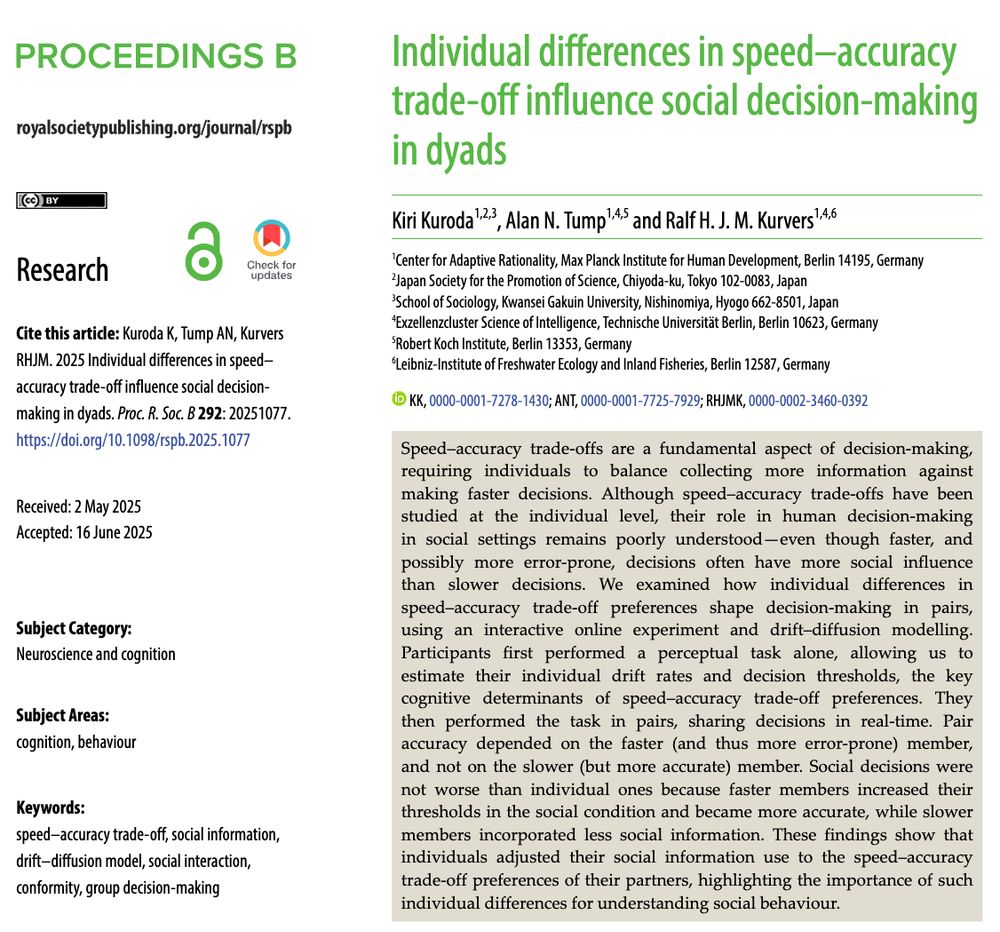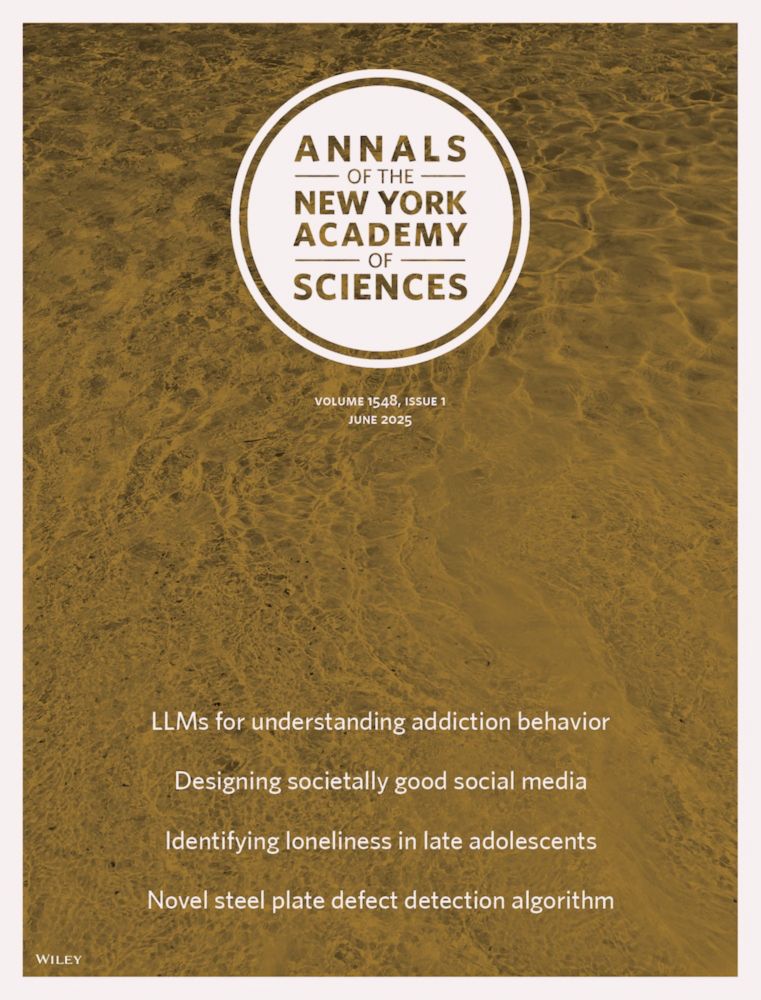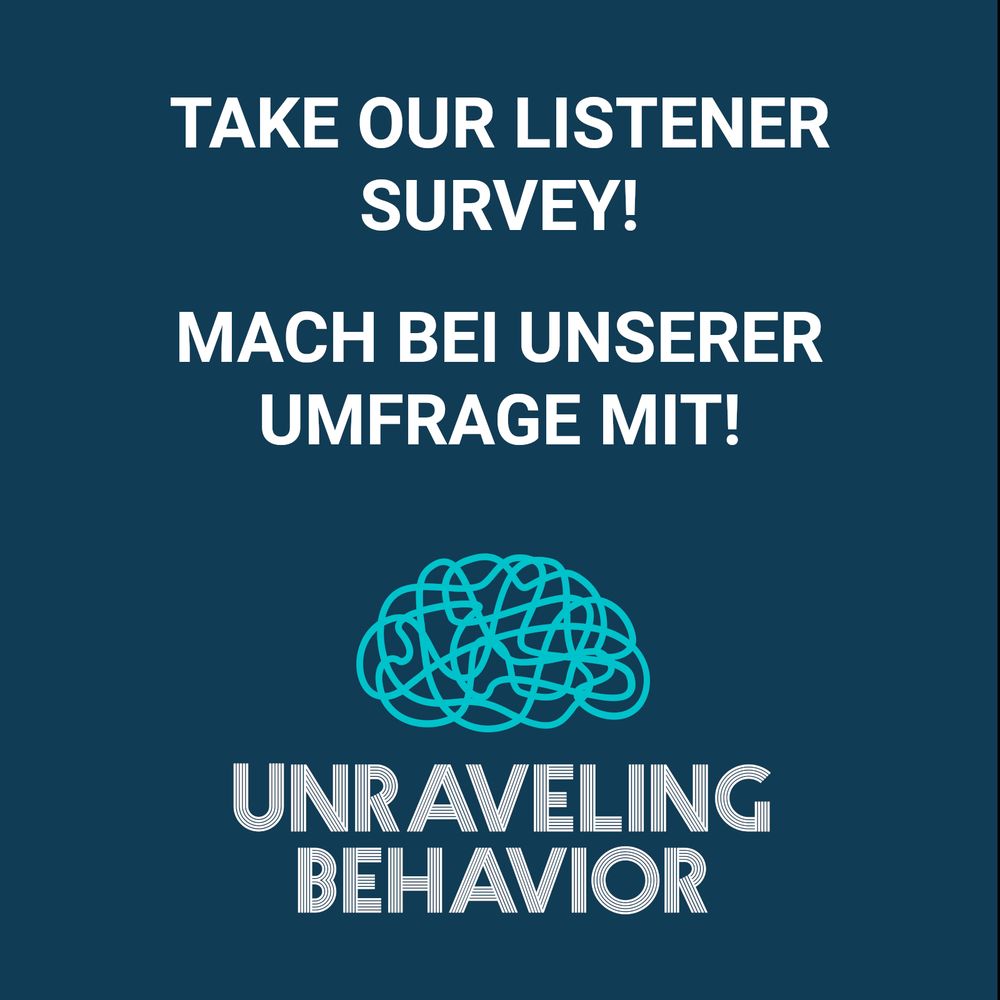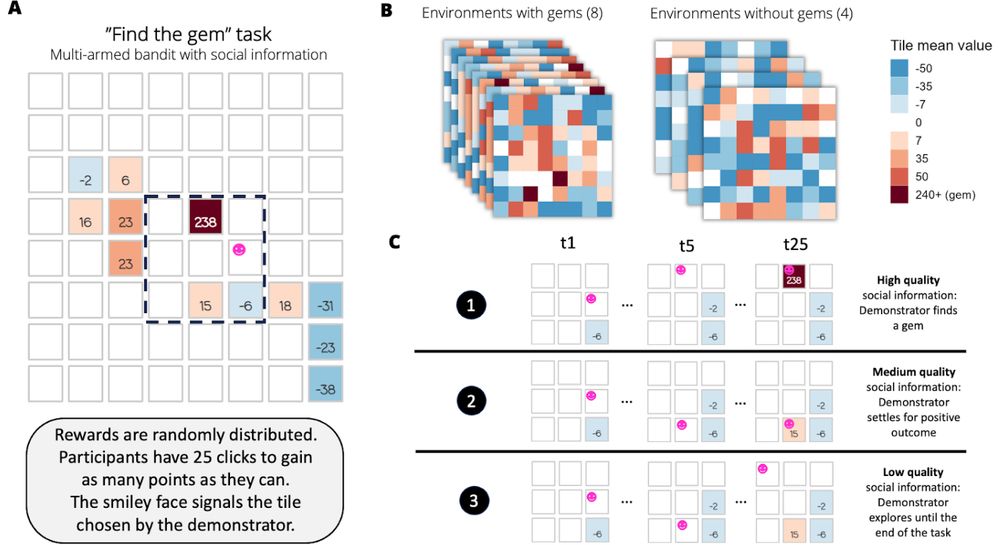
🚨Our paper has been published in Proceedings of the Royal Society B doi.org/10.1098/rspb...
w/ Alan Tump @alantump.bsky.social, Ralf Kurvers @ralfkurvers.bsky.social
@royalsocietypublishing.org
1/ 🧵👇
✨Join us in Berlin @arc-mpib.bsky.social June 08–16, 2026, to explore the topic of “Decision Making in the Age of AI”.
✏️ More details + application form (deadline: March 16): www.mpib-berlin.mpg.de/research/res...

✨Join us in Berlin @arc-mpib.bsky.social June 08–16, 2026, to explore the topic of “Decision Making in the Age of AI”.
✏️ More details + application form (deadline: March 16): www.mpib-berlin.mpg.de/research/res...
We tracked large groups of Finnish competitive ice-fishers to study how social foragers use social information when searching for resources. 🐟
Link: www.science.org/doi/10.1126/... (contact me for open access)
We tracked large groups of Finnish competitive ice-fishers to study how social foragers use social information when searching for resources. 🐟
Link: www.science.org/doi/10.1126/... (contact me for open access)
👉 Read more: www.mpib-berlin.mpg.de/newsroom/new...
📄 Paper: www.science.org/doi/10.1126/...
👉 Read more: www.mpib-berlin.mpg.de/newsroom/new...
📄 Paper: www.science.org/doi/10.1126/...
Excited to share new work led by @tikhomirova.bsky.social, presenting a large-scale evaluation of the accessibility of psycholinguistic information in transformer language models.
Preprint: arxiv.org/abs/2601.03798

Excited to share new work led by @tikhomirova.bsky.social, presenting a large-scale evaluation of the accessibility of psycholinguistic information in transformer language models.
Preprint: arxiv.org/abs/2601.03798
Shoutout and thanks to @danielnettle.bsky.social & @coraliechevallier.bsky.social ❤️🔥
tinyurl.com/mu7rzz6k

Shoutout and thanks to @danielnettle.bsky.social & @coraliechevallier.bsky.social ❤️🔥
tinyurl.com/mu7rzz6k
www.science.org/doi/10.1126/...
Big thank you to my coauthors @small-schulz.bsky.social and @lorenzspreen.bsky.social, and to all participants who discussed 20 political issues over 4 weeks in 6 subreddit, 3 experimental conditions and let us observe.

www.science.org/doi/10.1126/...
Big thank you to my coauthors @small-schulz.bsky.social and @lorenzspreen.bsky.social, and to all participants who discussed 20 political issues over 4 weeks in 6 subreddit, 3 experimental conditions and let us observe.
We show that the tendency to compress complex social information into priors about social structures becomes more pronounced during adolescence.
osf.io/preprints/ps...
I am soooooo excited to share this work, together with @mkwittmann.bsky.social and @yongling.bsky.social.

We show that the tendency to compress complex social information into priors about social structures becomes more pronounced during adolescence.
osf.io/preprints/ps...
I am soooooo excited to share this work, together with @mkwittmann.bsky.social and @yongling.bsky.social.
We developed an LLM-powered bibliometric analysis to characterize article clusters, investigate their connections, and examine the distribution of topics across the landscape.
osf.io/6c2va_v1
We developed an LLM-powered bibliometric analysis to characterize article clusters, investigate their connections, and examine the distribution of topics across the landscape.
osf.io/6c2va_v1
In new work led by Valerii Chirkov, we show that payoff selectivity is key in transforming a group of individuals into an intelligent collective 🤝🧠
www.youtube.com/watch?v=xY7n...
Preprint: osf.io/preprints/ps...

In new work led by Valerii Chirkov, we show that payoff selectivity is key in transforming a group of individuals into an intelligent collective 🤝🧠
www.youtube.com/watch?v=xY7n...
Preprint: osf.io/preprints/ps...
doi.org/10.1038/s442...

doi.org/10.1038/s442...
www.cell.com/trends/cogni...

www.cell.com/trends/cogni...
Excited to share this article, presenting a full tutorial on mouse tracking and other movement tracking techniques in psychological research, with examples from our R package mousetrap.
Paper: link.springer.com/article/10.3...
R package: pascalkieslich.github.io/mousetrap/in...

Excited to share this article, presenting a full tutorial on mouse tracking and other movement tracking techniques in psychological research, with examples from our R package mousetrap.
Paper: link.springer.com/article/10.3...
R package: pascalkieslich.github.io/mousetrap/in...
www.youtube.com/watch?v=WuDO...
www.youtube.com/watch?v=WuDO...
We ran large-scale simulations to test how well common behavioral tasks measure a person's semantic network.
doi.org/10.1371/jour...

We ran large-scale simulations to test how well common behavioral tasks measure a person's semantic network.
doi.org/10.1371/jour...
In our new paper, we discuss how generative AI (GenAI) tools like ChatGPT can mediate confirmation bias in health information seeking.
As people turn to these tools for health-related queries, new risks emerge.
🧵👇
nyaspubs.onlinelibrary.wiley.com/doi/10.1111/...

In our new paper, we discuss how generative AI (GenAI) tools like ChatGPT can mediate confirmation bias in health information seeking.
As people turn to these tools for health-related queries, new risks emerge.
🧵👇
nyaspubs.onlinelibrary.wiley.com/doi/10.1111/...
There are also opportunities to work with eye tracking, EEG, VR, 3D printing, and scientific computing.
See the link for more details!👇
www.mpib-berlin.mpg.de/2110361/2025...

There are also opportunities to work with eye tracking, EEG, VR, 3D printing, and scientific computing.
See the link for more details!👇
www.mpib-berlin.mpg.de/2110361/2025...
🚨Our paper has been published in Proceedings of the Royal Society B doi.org/10.1098/rspb...
w/ Alan Tump @alantump.bsky.social, Ralf Kurvers @ralfkurvers.bsky.social
@royalsocietypublishing.org
1/ 🧵👇

🚨Our paper has been published in Proceedings of the Royal Society B doi.org/10.1098/rspb...
w/ Alan Tump @alantump.bsky.social, Ralf Kurvers @ralfkurvers.bsky.social
@royalsocietypublishing.org
1/ 🧵👇
👉 𝗧𝗮𝗸𝗲 𝘁𝗵𝗲 𝗹𝗶𝘀𝘁𝗲𝗻𝗲𝗿 𝘀𝘂𝗿𝘃𝗲𝘆: survey.academiccloud.de/index.php/25...

👉 𝗧𝗮𝗸𝗲 𝘁𝗵𝗲 𝗹𝗶𝘀𝘁𝗲𝗻𝗲𝗿 𝘀𝘂𝗿𝘃𝗲𝘆: survey.academiccloud.de/index.php/25...
Adolescents' social sensitivity isn't a bad thing—it's adaptive! In our new study, led by amazing Andrea Gradassi @connectedmindslab.bsky.social, we show that teens learned to copy successful peers faster than adults in a new multiplayer exploration task.
osf.io/preprints/os...

Adolescents' social sensitivity isn't a bad thing—it's adaptive! In our new study, led by amazing Andrea Gradassi @connectedmindslab.bsky.social, we show that teens learned to copy successful peers faster than adults in a new multiplayer exploration task.
osf.io/preprints/os...

www.nature.com/articles/s41...

www.nature.com/articles/s41...
Lou Haux @mpib-berlin.bsky.social shows that chimpanzees adapt their exploration strategies to changes in the environment—exploring more in unstable conditions. Now out in Nature Communications @naturecomms.bsky.social
www.nature.com/articles/s41...

Lou Haux @mpib-berlin.bsky.social shows that chimpanzees adapt their exploration strategies to changes in the environment—exploring more in unstable conditions. Now out in Nature Communications @naturecomms.bsky.social
www.nature.com/articles/s41...
In this episode, I'm joined by @simyciri.bsky.social as we dive into why teens engage in risky behaviors—not out of recklessness, but due to a complex mix of developmental, social, and environmental factors.
tinyurl.com/bdcn2b4r

In this episode, I'm joined by @simyciri.bsky.social as we dive into why teens engage in risky behaviors—not out of recklessness, but due to a complex mix of developmental, social, and environmental factors.
tinyurl.com/bdcn2b4r

